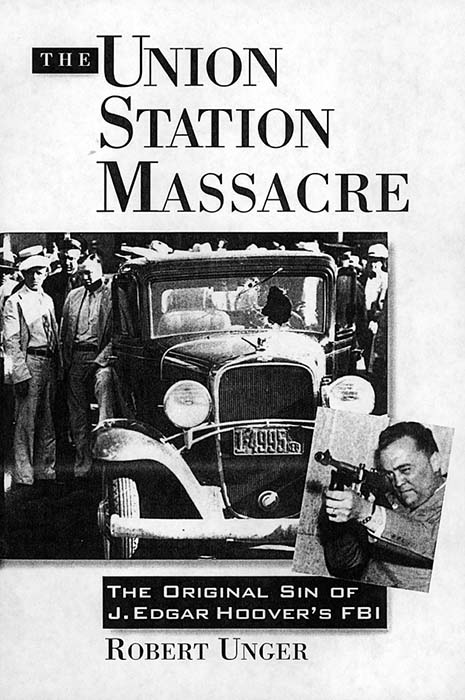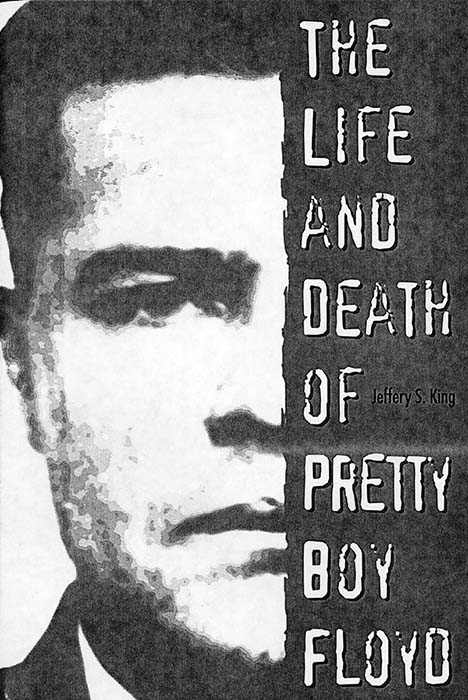By Rick Cartledge
A BRACE OF PRETTY BOY FLOYD: An SAR Book Review, Times Two
The code duello, a Southern tradition, finds few practitioners today. An ancestor of Theodore Roosevelt stood under the oaks in South Carolina, as dueling carried legal sanctions in Savannah. Mr. Bulloch emerged victorious. Ernie Kovacs suffered great distress when his first wife failed to return his babies from a visitation outing. His girlfriend at the time, Ms. Edie Adams, bought the famed television genius a pair of dueling pistols. Mr. Kovacs carried the matched pair under his overcoat for months as he searched the New York streets for his missing children. Not without good reason did Ernie Kovacs marry Edie Adams.
The following tells of two fine books. These books cover the hunt not for missing children but for an outlaw employing all of his wits not to be found. Seeking him was not a loving father but a South Carolina lawyer named Melvin Purvis. The first book takes the worst slice of the killer’s career and examines it as never before. The second book delivers the whole loaf in incredible detail. These two books, taken together, frame the best picture ever painted of Charles Arthur ‘Pretty Boy’ Floyd.
The Union Station Massacre -The Original Sin of the FBI’

by Robert Unger
At about 7:15 on the morning of June 17, 1933, local law and Agents of the Justice Department’s Bureau of Investigation attempted to transport captured felon Frank ‘Jelly’ Nash back to Leavenworth Prison. They got off a train from Arkansas at the Union Station in Kansas City and escorted Nash to a Chevrolet in the parking lot. Adam Richetti, Verne Miller, and Pretty Boy Floyd descended on them attempting to cancel Nash’s extended reservation at the grey bar hotel. One of the officers made a bad career move. He pulled iron against the leveled muzzle of Pretty Boy Floyd. The resulting melee brought on the 1934 Gun Control Act and catapulted J. Edgar Hoover’s sub agency into what it is today.
This story held great fascination for Kansas City native Robert Unger. The Pulitzer Prize winning journalist sought to clear the fog that had hung over his city since 1933. To accomplish this, Mr. Unger knew he must unlock the true story of the massacre. He found the key tucked in the Freedom of Information Act. Under that act, Mr. Unger sought and received the 89 volume FBI file on the Kansas City Massacre at Union Station. He then spent the next fourteen years researching, gathering photographs, and writing this thrilling true story of early 30’s crime. The resulting book unlocks the mysteries of the Union Station Massacre and blows the fog away.
Robert Unger not only gives the reader a fascinating slice of early 30’s crime that reads like a novel, he delivers more. Our SAR legal writers — James Bardwell, Basil St. Clair, and James Jefferies — will find this book as intriguing as the dedicated emma gees shooting 30’s guns. In the FBI file, the agents wrote with complete candor, secure in the knowledge that their words would never see the light of day. They omitted the CYA prose and legalese used by bureaucrats today. In so doing, they told a tale of uses and misuses of power, tainted evidence, and competent and incompetent police work. Mr. Unger skillfully relates all of this to modern times. In short, Mr. Robert Unger offers a fine read illustrated by rare photographs. For readers wishing to taste this slice of Pretty Boy’s life, Andrews McMeel Publishing in Kansas City awaits your call at 1-800-247-6553.
The Life and Death of Pretty Boy Floyd

by Jeffery S. King
Jeffery King inhabits one of the most enviable environs for the dedicated early 30’s crime writer. A respected research librarian now retired, Mr. King lives in Washington, DC. His residence affords him easy access to the National Archives. Mr. King’s acknowledged professionalism showed him early on ‘where the bodies are buried’. Our astute readers will find this writer in the acknowledgments of Jeffery King’s book. Readers should know that I hold no pecuniary interest. Greater praise goes to the other writers and researchers acknowledged. The greatest praise goes to Mr. King himself for research well done and a story well told.
As a boy, this writer’s grandfather told me of meeting Mamie and Walter Floyd and their knee high son Charles beside their wagon in Ila, Georgia’s Hebron church yard. The year was 1907. He called the Floyds “good God fearing people who farmed the land”. Pretty Boy’s fate upon reaching Oklahoma grieved him some. Just before I went to college, we talked about the Floyds for the last time. He openly asked why all the trouble had come to Pretty Boy, as if I in my seventeenth year would have known. Today as I approach my fifty second year, I do. For those who want the saga of the Sagebrush Robin Hood in depth, I direct them to Jeffery King’s book. Witihin its pages the reader will find his pompadour, the Tommy gun, and his bullet proof clothes.
In his book, Jeffery King calls Charles Floyd not highly intelligent but cunning. Faithful readers know that this writer has called him highly intelligent, not well educated, and clever. Readers may think that Mr. King and I disagree. We do not. We view the same overlapping facts from a different perspective. Writers and journalists carrying diplomas from the latter day government schools toss around clever and cunning as if they interchange. They do not. Some Knob Creek campfire safety wisdom will save our readers a mad scramble to the dictionary. ‘It’s like being shot with an unloaded gun. Whether the gun was loaded or not, you’re still shot.’ Jeffery King chose the precise word. This example of Jeff’s word precision gives the reader an inkling of the scholarship that Mr. King brings to his subject.
Jeffery King tells Pretty Boy’s story with depth, detail, and textures. These elements this writer appreciates, in the best sense of the word. Jeff King well captures the good people from whom Floyd came and those who loved him despite his outlaw ways. Perhaps Jeff’s strong finish to his book best showcases the fine wares contained within. He first quotes Ma Joad from John Steinbeck’s The Grapes of Wrath. The fictional Joads hailed from Charlie Floyd’s last home town of Sallisaw, Oklahoma. Mr. King then takes us to some Pretty Boy lines from Woody Guthrie. He closes by referencing a revue of Outside The Law, a play based on William Shakespeare’s As You Like It. With As You Like It, Jeffery King speaks well for both his book and that of Robert Unger. For those who would know the Sagebrush Robin Hood better than they do now, Kent State University Press awaits your call at 1-800-247-6553.
Parting Shots
Emma gees will notice a few minor gun mistakes in both books. This writer spoke at length with both authors. Both men stated that they were not gun guys. Both stated that the research told them that firearms played a significant role in the life and death of Pretty Boy Floyd. Both authors stated that they worked very hard to understand the gun part of the story and to correctly report it. Emma gees and SAR readers cannot expect every writer to know the silky smooth bolt of a Colt Thompson or the glass slick hammer of a pre-War automatic. Mr. Unger carries a shared Pulitzer Prize and a dozen nominations for same as part of his professional credentials. Mr. King upon retiring from a successful research career wrote a fine book that a prestigious university press enthusiastically accepted. Both Robert Unger and Jeffery King approached the Floyd story without agenda. They followed the facts where they lead and reported them in a straightforward fashion. This writer applauds their efforts.
Readers of both books will find a variation in their Union Station Massacre story. Mr. Unger’s book and research were not available to Jeffery King until after his book went to press. Some researchers may complain that Robert Unger’s book lists two major sources either not commonly available or unavailable to them. I do not. Additional KCR campfire wisdom tells why. ‘It’s OK to bring two guns to a gunfight. If they’re the right guns, two is all you need.’ Were this writer to write a book on Floyd, I would rely on Mr. Unger’s journalistic integrity.
In the motorized bandit section of Thompson: the American Legend the name Herb Farmer popped up in my text more than once. Of Charles Arthur Floyd and his funeral I wrote the following, ‘…to the hardworking people around Sallisaw and Akins, he was neither outlaw nor killer but one of their own who was finally at peace and had finally come home.’ From these two fine books the reader may learn, in depth, why. Well done Robert Unger. Well done Jeffery King.
Andrews McMeel Publishing
4520 Main ST
Kansas City, MO 64111
816-932-6700
Kent State University Press
Kent State University
Kent, Ohio 44242-0001
330-672-7913
| This article first appeared in Small Arms Review V1N11 (August 1998) |











